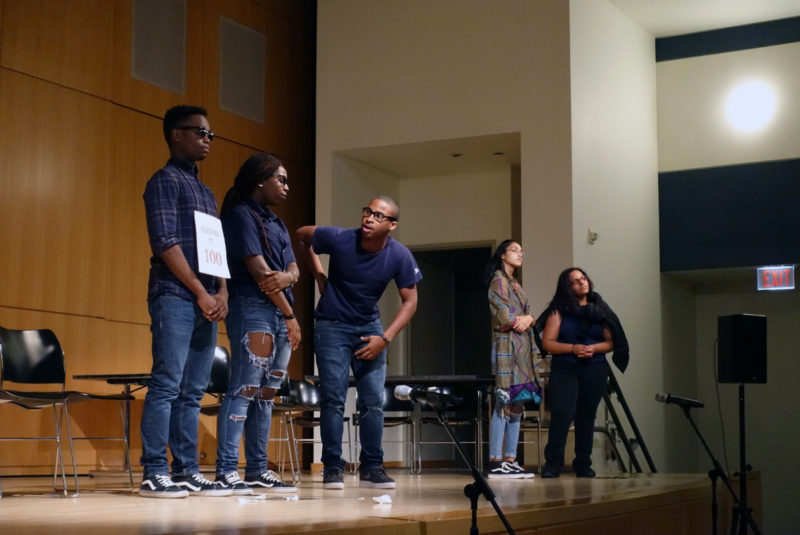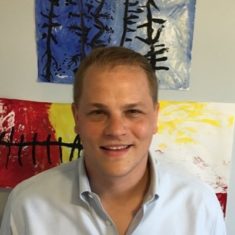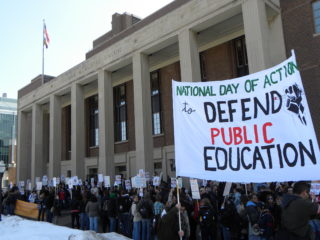At the event, “The Future of Public Education: Searching for The Public Good Amid Gentrification, Privatization, and Inequality,” members of Dr. Amy Stuart-Wells’ research team and Public School Support Organization, The Public Good, reported on their investigations into how dynamics of segregation and displacement play out in schools in gentrifying neighborhoods.
Dr. Wells began by placing the work of integrated schools within a much broader global context that is increasingly hostile towards all types of social welfare systems. She also drew the audience’s attention to the broad historical and policy trends that have shaped segregated cities in this country, drawing attention to the ways in which gentrification is leading to new waves of resegregation. In explaining the school-community engagement components of the Public Good’s work, she noted the importance of the organizing questions of their work: who is absent from the room when discussing race and education, who is present yet silent, who is speaking but not speaking the truth, and who is not hearing the truth.
Diana Cordova-Cobo followed up with a thoughtful analysis of both physical and cultural displacement, noting how housing segregation and school segregation are deeply intertwined processes. Attending to the voices of community members, she powerfully noted that displacement and erasure are not inevitable and can be interrupted through thoughtful, concerted action. Lauren Fox discussed the paradoxes of privileged white parents, who often consider themselves progressive in their politics but whose “white savior” self-concepts and deficit framing of communities of color often lead to displacement and support of school privatization. In one particularly powerful anecdote, she talked about wealthy white parents opening up checkbooks at parent meetings and how that had a powerful effect on middle and working class parents of color who were not able to contribute in that way, and thus felt that their participation in school was devalued. Dominic Walker drew comparisons between deficit-driven conceptions of communities of color in gentrifying neighborhoods and students of color in STEM subjects. In response, he called for deeper strategies of integration that go beyond engagement in order to address racial hierarchies in the curricula. He called for both internal and external work that creates spaces for children of color to see their communities as sources of intellectual exploration, as well as to bring diverse families together to unlearn damaging narratives. Juontel White discussed how The Public Good engages communities in that work and how they come together to construct knowledge alongside and in partnership with the communities in order to create specific and immediately relevant findings for each site. Abbey Keener joined her in calling for a reframing of what a “good” school is – asking if it is one with high test scores and coffers loaded by the type of involved parents who are happier to write checks than advocate for better curricula; or is it one characterized by fairness, caring, and community?
The panel was followed by a performance from the incredible young people of the EPIC Theater Ensemble. Their play Laundry City gave voice to the multiple perspectives of students, educators, and families affected by segregated schooling (in documentation video, the play begins at 1:10:1). Performed by high school students Miguel Delacruz, Nashali Perez, and Nakkia Smalls along with Olivia Dunbar and Davion Osbourne (who also contributed to the writing of the play with students Vickandy Figueroa, Jeremiah Green, and Melysa Hierro), Laundry City attends to the paradoxes of segregation, gentrification, privatization, and inequality. The play and its young writers and actors eloquently captured the elusive complexities inherent to conversations about contemporary racial segregation. Hilariously funny and pointedly critical, the play brilliantly wove together short skits wherein siblings quarreled over resources in a ‘separate but equally shared’ room and a principal’s “keeping it 100” honesty translator undermined the hollow platitudes she delivered about unity in a climate of test-based accountability and underfunding.
At the end, an audience member asked the young actors about how they themselves navigated the high school choice process, which ostensibly is in place to provide a more equitable distribution of opportunities for all students but has also been critiqued for perpetuating segregation. The students replied that while they did not account for unevenly distributed resources or test performance in their high school applications, they became acutely aware of the scale of inequality once they arrived in their high schools. In working with EPIC to research and perform their learning, they developed sharp critiques of the problems posed by segregation, exemplified by a debate among the characters at the end of the play, one of whom expresses their sheer disbelief that “Segregation is still a problem in New York City? In 2017?” Another character states simply, “We need integration. It doesn’t have to come from a revolution, it just has to come,” while finally another points out, “If integration made money somehow, then America would do it.”


